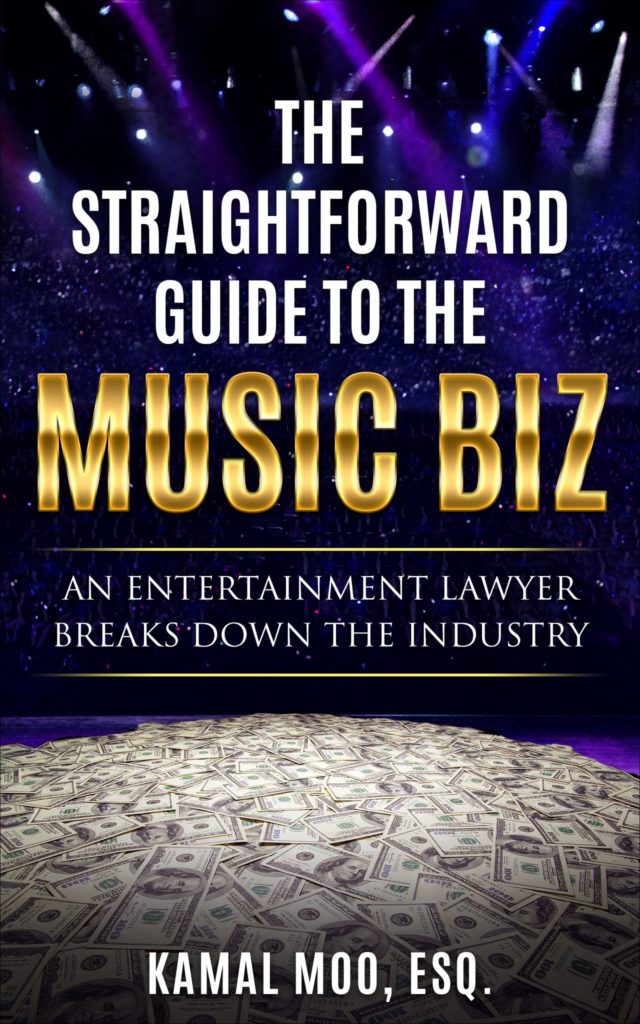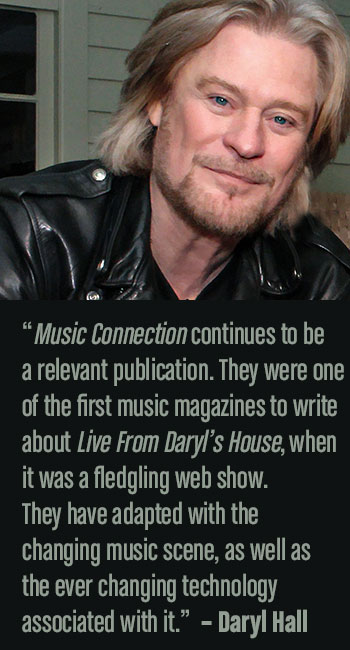Congrats, you’ve been offered your first record deal! Now what? Well, of course I’m a bit biased, but your first order of business should be to find a knowledgeable attorney to represent you. Also, be aware that music/entertainment is its own specialized area of law, so hiring your uncle who handles car accidents and slip-and-falls to negotiate the deal may not be the best idea.
Overall, there are a few points you should be aware of when you’re presented with a record deal, and we will go through some of the most important ones. This article is largely adapted from Chapter 4 of my new book, The Straightforward Guide to the Music Biz: An Entertainment Lawyer Breaks Down the Industry, which is available in both paperback and eBook format. Also, anything I discuss in this article is for informational purposes only and should not be considered legal advice. Okay, now that all that is out of the way, let’s get to it…
1. Exclusivity

When you sign with a recording label, you are agreeing to make sound recordings and “audiovisual” recordings (i.e., music videos) exclusively for them. This means that during the “Term” of the contract, you cannot record or release music for anyone besides the label. Also, this exclusivity restriction will be throughout the “Territory,” which will usually be defined as “the Universe” or “the world.”
Now, you may want to make guest appearances on recordings for other labels during the Term, which is very common in the music business. In those cases, the other label will need to get permission (aka waiver) from your label allowing you to make the recording. Your label will most likely want some credit on the release saying, “X Artist appears courtesy of Y Records.” And, sometimes, a fee and/or royalty payment will be negotiated between the labels.
2. Term
As discussed above, the “Term” of a recording agreement is the amount of time you are exclusively signed to the label. Typically, instead of a set amount of years, the Term is divided into “album cycles.” For example, the agreement will say the Term will start on “execution,” (the date the contract is signed) and will continue until 18 months after the label commercially releases your first album.
An “option” allows the label to extend the Term of the contract. So, if you deliver your first album to the label and they release it, they will have a certain amount of time after the release date to exercise their next option. If they do, they may require you to record a second album (aka an option album), which of course means the Term will be extended to 18 months after the commercial release of that second album.
Most record deals will have multiple options, which means the Term may keep getting extended and you’ll need to keep delivering albums. In my experience, most labels will want two to three options, but I’ve seen contracts with five to seven options! As a general policy, artists usually want the overall Term to be as short as possible.
3. Recording Commitment
As I mentioned above, during the initial period and each option period of the Term, you’ll be required to satisfy certain delivery commitments. Usually this means an album, but it could be an EP or a single. Sometimes a label will test out an artist by having them record a single or two and, based on how those perform, they can decide if they want to move forward and exercise an option for a full album or EP.
You’ll notice the contract refers to your recordings as “masters,” which is short for “master recordings.” They’re called master recordings because they are the master file from which all the copies are made for distribution.
The contract will also define what qualifies as a “master.” Usually, the label will only want new masters and won’t accept recordings you made prior to the contract. However, sometimes the label will want to acquire and release your previous recordings if you happen to already have a hit track out there in the market. The contract will also say that you won’t turn in albums that are made up of “greatest hits,” “live concert,” “novelty” or “holiday” recordings. Unless, of course, you’re an artist who exclusively records Christmas music.
Also, a “re-recording restriction” says you won’t be allowed to re-record any of the masters for a period of around 3 to 5 years after the end of the Term. This is of course because the label doesn’t want you making a new version of an already existing recording since that new version will compete with theirs.
4. Creative Decisions
Unfortunately, one concept you’ll have to accept is that the label will always have the final say regarding creative and financial decisions, such as selection of producers, selection of compositions to be recorded, approval of guest artists, budgets, expenditures, etc.
For obvious reasons, this can be a source of tension between the artist and the label. This is why it’s crucial to try and make s
ure the label understands your creative vision and the direction you’d like to take your music. But don’t get me wrong, there are some very talented A&R (artist & repertoire) people at labels whose responsibilities include helping artists find the right songs and producers that fit the artist’s style. And, in my opinion, the best labels realize it’s better to nurture an artist’s creativity rather than dictate how their music should sound.
The good news is that, once you achieve a certain level of fame and success, the labels will tend to ease up and give you more freedom in your creative decisions.
5. Advances
An “advance” is basically money the label gives you up front, which is recoupable against your artist royalties, which we’ll discuss in the next section. Some indie labels pay very small or even no advances. Or, if an artist is established or has a lot of buzz, the advances can be substantial. Also, be aware that, depending on the contract, any money that’s spent on your project by the label, including recording and marketing funds, will sometimes be treated as additional advances, which will need to be recouped.
It should made clear that record contract advances are not “free money.” Even though you don’t need to pay back the advance out of your own pocket if your album flops, you still need to be “recouped” (i.e., the label needs to make its money back) before you receive any artist royalties. Recouping your advance means that any royalties payable to you under the contract will first be applied toward your advance debt, and you will only receive royalties after your outstanding advance is fully repaid. Each time you take an advance, think of it like credit that will need to be paid back from your royalties.
The label will usually break up the advance payments into installments. For example, you might get 50% of the advance up front and the remaining 50% after they’ve approved the album you’ve turned in.
6. Artist Royalties
Once your advances have been fully recouped, then you’ll start receiving royalties on sales of your recordings. Your royalties will usually be “all-in,” which basically means, if you hire a producer who will also be entitled to a royalty, his/her royalties will be deducted from your artist royalties. For example, let’s say your all-in artist royalty rate is 16% (this is sometimes referred to as 16 “points”) and your producer is entitled to four points on your recordings, then that means, in effect you’re getting 12 points and the producer is gettingfour points.
In addition, the label will usually increase your royalty rate based on success. For example, if your album sells over 500,000 copies, then your royalty rate could be increased from 16% to 18%.
Also, the label will take all sorts of “deductions” before they pay you royalties. These deductions will typically be for packaging, foreign sales, so-called “breakage,” budget records, record clubs, albums sold via TV advertising, etc. Also, since you are only paid royalties on so-called “royalty-bearing” recordings, you won’t be paid on free or promotional records the label gives away (aka free goods). To put it bluntly, a lot of these deductions are just accounting tricks which allow the label to pay you less money. Unfortunately, this is just a reality in the industry, but if you have a good attorney on your side, he or she can push back and try to limit the amounts and sizes of these deductions.
Some of the more fair-minded labels won’t take these deductions on digital downloads and will only apply them to physical copies, such as CDs, vinyl, etc. But, it’s important to have a sharp eye when analyzing how the labels will calculate digital income.
7. Music Videos
Your record deal will obligate you to appear in music videos featuring your masters if the label chooses to produce them. Music videos are proven marketing tools and, thanks to licensing arrangements with sites like YouTube, they can actually generate income. Again, all of the decisions regarding your music videos, such as selection of the director, story concept, and determining the budget will be subject to the label’s approval. Also, depending on how your deal is structured, the label will usually recoup between 50% and 100% of the music video costs as an advance or an “off the top” expense.
8. Ownership Rights
The contract will almost certainly say that all master recordings and audiovisual recordings (music videos) you create during the Term (and maybe certain recordings you created before the Term), along with any artwork and other marketing materials you contribute to, will be exclusively owned by the label for the life of the copyright. All those works will be considered “work made for hire” for the label.
I don’t want to get too deep into the intricacies of copyright law, but basically, “sound recordings” made by independent contractors, which is likely what the label will classify you as, aren’t included in the list of things that qualify as “work made for hire” under the current copyright law. So, as a back-up, you’ll probably see additional language in this section of the contract which says that, if your recordings don’t qualify as “work made for hire,” then you’re “assigning” (i.e. transferring) all your ownership rights to the label instead.
Assignments also get interesting because there’s a quirk in the copyright law that states copyrights which are assigned can be re-claimed by the author after 35 years. Remember, our current copyright law only came into effect in 1978, so the first windows for reclamation started opening only a few years ago. The requirements for reclaiming your copyright after this 35-year period can get complex, so please contact a qualified attorney if there are some copyrights you’d like to try and reclaim.
Some people believe that, as a matter of principal, it’s not right for a label to own the masters and that the artists should own them instead. If that’s your belief, then I would highly recommend that you don’t sign a record deal. In fairness, labels will expend a lot of effort and spend substantial amounts of money producing and marketing records. And, given that there’s always a real risk that an album won’t ever turn a profit, it’s logical that the label would want to own the recordings they’re funding. Or, put another way, wouldn’t you want to own a house you paid to construct?
9. Name & Likeness
In the contract, you’ll also be granting the label the right to use your name, photos, likeness and biographical information to market your recordings. This is customary, but it’s a good idea to make sure you have approval rights, because you don’t want them using photos of you that you find unflattering or embarrassing.
10. Distribution Agreements
Labels will usually have a distribution agreement in place with a distributor that will actually release your records. That is, distributors are the companies that physically manufacture and distribute CDs, vinyl records, etc. For example, Def Jam, Interscope and Republic Records are all distributed by Universal Music Group. And, of course, there are smaller labels that will have distribution deals in place with indie distributors, or they will produce your album first and then shop it around for distribution.
If your label doesn’t already have a distribution contract in place, there will usually be language in your contract saying that, if the label signs a distribution agreement and there are parts of that agreement that conflict with your record contract, then the deal points in the distribution agreement will win out. This can be anything from how often royalty statements are issued, to increasing the number of option albums.
Ideally, you’ll want the label to already have a distribution deal in place so you know what you’re getting into and not be blindsided by a distribution contract they may later sign. However, if your label signs a distribution deal after you sign with them, they most likely won’t give you any approval rights over what’s in that contract. But, to help protect yourself, you’ll want to include language that gives you “meaningful consultation” rights and the ability to have a voice in the label’s negotiations with the distributor.
11. Ancillary Income
A long time ago, before you could download music from the internet, people would actually have to buy physical copies of records if they wanted to own music. Crazy, right? The most common formats were CDs, cassette tapes and vinyl records. In those days, record companies were making a killing from record sales, so the artists were free to keep all the money they made from other sources, such as touring, merchandise, etc.
However, with the rise of online piracy, record companies have seen a steep decline in their record sales. As a result, labels started signing “360” deals with their artists rather than traditional record contracts. The concept is pretty simple: as part of the deal, the artist agrees to pay the label a percentage of their other entertainment income, such as income from touring, merchandising, acting, modeling, endorsement deals, belly dancing, etc. Some contracts will refer to this as “ancillary income participation.” The amount the label will take usually depends on the label’s policies and how much they’re paying you in artist royalties.
12. Controlled Compositions
When the recording artist also writes or co-writes their own songs, the contract will refer to these as “controlled compositions” because they are “controlled” by the artist and they are treated a little differently. Remember that in order for a label to record and distribute copies of a recording, they need a “mechanical license” from the songwriter/publisher that owns the composition and, in exchange, the label will pay a minimum mechanical royalty of 9.1 cents per copy sold.
However, when it comes to controlled compositions, the label will want to pay less than the normal 9.1 cent rate to the artist. Noticing a pattern here? As such, the mechanical royalties paid to the artist will usually be reduced to 75% of the normal rate, which works out to about 6.825 cents per copy. Also, the label will usually only pay based on the “minimum rate,” which means that the amount won’t increase even if the song is longer than 5 minutes. If you have some leverage, you can try to push back and get the full 9.1 minimum rate.
In addition to paying a reduced mechanical royalty on controlled compositions, the label will also impose “caps” on the number of compositions they will pay the artist per project. For example, the label may only pay mechanical royalties for a maximum of 10 controlled compositions on an album, regardless of whether there are more, and for EPs, the cap is usually five.
13. Groups
If you’re part of a band that’s being offered this record deal, then there will be extra language in the contract addressing what happens if one of you quits the band. In that case, the label will usually decide if they want to terminate the contract early or if they want to continue with the band, minus that member. Also, the label will usually have the option for a certain amount of time to sign the leaving member to a separate record deal on substantially the same terms as this contract. If the band breaks up, then all the members will usually be treated as “leaving members.”
As you can imagine, if a leaving member signs a separate record contract with the label, any music recorded under that contract won’t reduce the number of the albums your band still owes. Also, your contract will address how royalties will be treated with respect to the leaving member and the recoupment of advances still owed.
If you’re a minor (under 18 years old) and a label wants to sign you, then things get a little more complicated since minors generally can’t sign contracts. However, the rules are slightly different in the entertainment industry, because, obviously, there are many working actors and singers who are minors. Under California law, the label and the minor’s parents/guardian can bring the contract to a Superior Court and request that the judge approve it. If it is approved, then the minor won’t later be able to terminate (aka disaffirm) the contract just because they’re underage.
Also, under California law, the minor’s parents/guardian are required to set up a trust account for the child performer (Coogan Account) and the employer is required to set aside 15% of the child’s earnings in that account. Once the child reaches the age of majority, they will have access to those funds.
In addition, most labels will also want the minor’s parents to sign a document giving consent to the minor to enter into the contract and which guarantees that the minor will fulfill his or her obligations. This of course means that if the child does not fulfill the contract, then the parents will legally be on the hook.
KAMAL MOO is a graduate of the University of Southern California and Southwestern Law School. Born in Kingston, Jamaica and raised in Miami, Florida, he currently resides in Southern California with his wife and daughter. Throughout his career, he has represented musicians from various genres of music as both personal manager and attorney. He has negotiated small indie deals and multimillion-dollar agreements, and everything in between. His clients include recording artists, producers, record labels, music publishers, and other figures in the entertainment industry. A frequent lecturer on the music industry, he has also taught music publishing at Southwestern Law School. He is the author of The Straightforward Guide to The Music Biz. kamalandrew.com.















